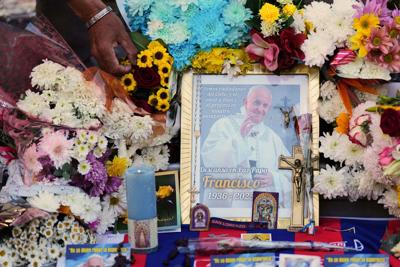Franciscus.
A one-word, self-selected epitaph will grace the grave of Pope Francis. His body, according to his wish, will not be sealed in an ornate edifice, but buried, simply, in the earth.
Like his papal namesake, St. Francis of Assisi (c.1181-1226), the patron saint of ecology, Pope Francis had an expansive heart, one big enough to house a deep love of the poor and a profound affinity for creation.
In his landmark 2015 encyclical, “Laudato Si‚Äô: On Care for Our Common Home,” Francis encouraged not just Catholics, but ‚Äúevery person living on this planet‚ÄĚ to open their ears, hearts, and minds to the ‚Äúcry of the earth and the cry of the poor.‚ÄĚ
In listening to the marginalized of both humanity and the natural world, Francis proposed an ‚Äúintegral ecology,‚ÄĚ in which social justice and ecological integrity formed a seamless garment of concern.
Claiming that ‚Äúnothing in this world is indifferent to us,‚ÄĚ ”Laudato Si‚Äô” cautioned against ‚Äúobstructionist attitudes‚ÄĚ when dealing with our ecological crisis, ranging from ‚Äúdenial of the problem to indifference, nonchalant resignation or blind confidence in technical solutions.‚ÄĚ
His encyclical, which U.S. environmentalist Bill McKibben describes as perhaps ‚Äúthe most important piece of writing so far this millennium,‚ÄĚ calls for ‚Äúan ecological conversion.‚ÄĚ
By forcefully proclaiming the ecological crisis as an urgent moral issue, Pope Francis played a critical role in the landmark 2015 Paris Agreement on climate change, with nearly a dozen world leaders referencing the pope in their conference remarks. (One Latin American delegate at the Paris conference confided to me that Pope Francis had so elevated the stakes that if his country did not support the agreement, they would appear not only morally bankrupt, but politically obsolete.)
Francis’s ecological advocacy also sired numerous Catholic climate groups around the world, such as the Economy of Francesco, an international youth group dedicated to Pope Francis‚Äôs notion of the ‚Äúeconomy of friendship,‚ÄĚ as well as the Farm of Francesco, a spiritually based, regenerative agriculture group based in Italy.
Perhaps the largest organization engendered by the encyclical, however, is the the Rome-based, nonprofit Laudato Si‚Äô Movement. As indicated by its website, the movement has worked in 140 countries and trained approximately 20,000 community “animators,” who plant trees, organize litter clean-ups, stage marches, provide creation care education, and advocate for eco-friendly policies.
According to University of pc28ĻŔÕÝProfessor Simon Appolloni, whose co-edited book, “Generation Laudato Si‚Äô,” brings together the voices of over 40 youth from 20 countries who have been inspired in their eco-activism by “Laudato Si‚Äô,” Francis was able to galvanize young people the world over ‚Äúbecause he listened.‚ÄĚ In an email, Appolloni noted, Francis ‚Äúdid not preach at youth, but shared his love for the awesome beauty called creation.‚ÄĚ
Yet not only youth have taken up the papal eco-challenge.
Catholic bishops in Ecuador joined Indigenous and youth leaders in 2023 to block oil drilling in Yasuni National Park. Brazilian bishops have begun teaching ‚Äúintegral ecology‚ÄĚ in their over 10,000 parishes, and the on Francis’ birthday in 2023 that it would shift to 100 per cent renewable energy.
Moreover, since charity and eco-credibility begin at home, Pope Francis ordered the Vatican to erect solar panels designed, in the pope‚Äôs words, to supply ‚Äúthe complete energy sustenance‚ÄĚ of the Vatican.
As Bill McKibben recently noted in his newsletter, the Vatican will ‚Äúsoon be the first nation powered entirely by the sun.‚ÄĚ
Pope Francis’s vision, however, is not just for a green church; it is for a reimagined world. Blending science, economics, politics and compassion, he offers a vision of a humble sense of the human within a highly interdependent creation, a creation besmirched by human greed but ever-lined with divine love.
Like a simple seed, Pope Francis’s body will be returned to the earth.
His ecological legacy, however, is rooted in a deeper ‚Äúintegral ecology‚ÄĚ ‚ÄĒ tendrils which will continue to grow, but only if we tend them.






























To join the conversation set a first and last name in your user profile.
Sign in or register for free to join the Conversation